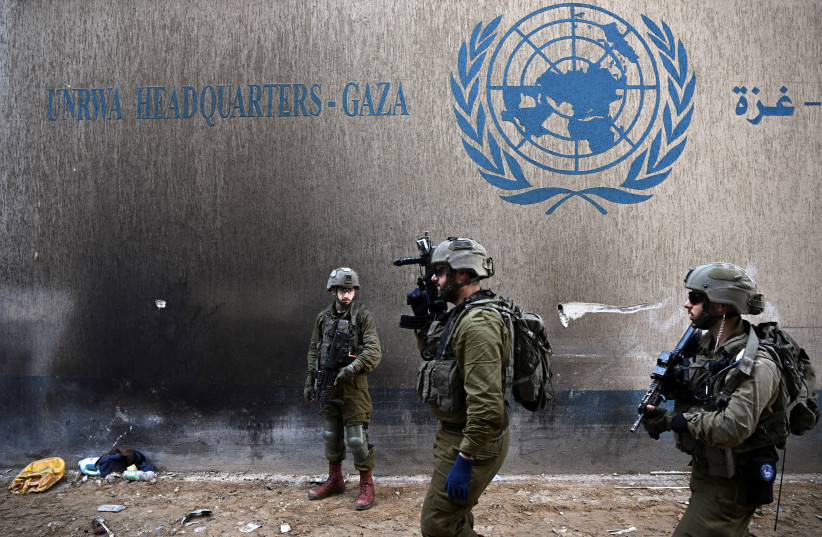The blatant evidence of UNRWA employees’ involvement in Hamas terrorism, including direct participation in the brutal October 7 slaughter, has finally put this and other failed UN agencies under a spotlight. They are not alone – allied non-governmental organizations (NGOs) operating under the banner of humanitarian aid also have a long history of cooperation with Palestinian terror, as well as malicious disinformation and advocacy.
The case of World Vision highlights the potential for stealing materials and funds that are provided for humanitarian objectives. In 2016, World Vision’s Gaza director was arrested for helping Hamas divert $50 million provided by the Australian government, and a few years later, he was convicted and sentenced. The judge’s decision, as well as publicly available financial records and a court-ordered audit, expose the lack of oversight and due diligence by World Vision officials, despite the obvious fact that they were operating in a terror-controlled entity.
In another example, in 2018, during violent confrontations orchestrated by Hamas along the Gaza border (now understood as rehearsals for October 7), the Norwegian Refugee Council (NRC) hired Yasser Murtaja, described as a journalist, to use a drone “to document for NRC the bitter prolonged struggle faced by Palestinian refugees in Gaza.”
Mortaja was killed in one of the clashes, and shown to be a Hamas official. Instead of acknowledging the evidence, NRC head Jan Egeland stepped up his lobbying against counter-terrorism measures designed to prevent Hamas from commandeering aid. Egeland and the NRC have a long record of systematically ignoring and erasing evidence of terror diversion, while falsely asserting that tighter oversight is “the primary obstacle to humanitarian action within Gaza.”

In addition to direct terror links, the NGO aid industry’s deliberate silence when everyone in Gaza knew about the construction of a massive terror infrastructure, adds to the evidence of complicity. In contrast to a few courageous journalists and doctors who warned about the network of tunnels being built by Hamas under Gaza’s schools, hospitals, residences, and everywhere else, officials from many aid NGOs pretended not to know. In parallel, they actively promote false accusations (i.e., lies) and seek to prevent Israel from effectively countering terror attacks, not as minor add-ons, but as central agendas.
Understanding Israel's decision
THESE ACTIVITIES provide the background to understand the Israeli government’s decision to freeze and review the NGO applications for special humanitarian aid visas and renewals that, until now, had been granted routinely. The move is officially explained as necessitated by “the complex security situation created after October 7,” and a long-overdue necessity of shifting oversight to the more “relevant government ministries.”
The process is essentially unchanged since the 1967 Six Day War, when the Jordanian list was adopted by Israel’s Social Welfare Ministry, in coordination with the Interior Ministry. Neither office had the professional capacity to monitor NGO activities or to take action.
However, it is clear that in Israel’s highly complex and unique situation, the decisions on “humanitarian aid” visas require the direct involvement of the security frameworks, including the National Security Council, and the Defense and Foreign ministries. They have the expertise and access to indications of terror diversion and to NGO soft-power demonization (propaganda).
As in all countries, the entry of foreigners is not a right but a privilege granted according to the criteria set by the state. In the past, the Israeli government rejected applications for individuals as distinct from organizations, who abused their visas to promote political boycotts.
Questions regarding the abuse of organization-based aid visas have also been raised in the past and became focused after October 7, as NGO political advocacy and demonization greatly increased. For example, Oxfam joined lawsuits seeking foreign government restrictions on components for vital IDF counter-terror weapons. As in the case of UN officials, the NGO accusations and slogans are automatically parroted and amplified in media reports and by antisemitic mobs.
For the powerful NGO industry, awareness that they will be held accountable for their actions is significant. In the absence of visas and being able to direct and advertise their activities on the ground, the NGOs face substantial financial costs, as donors withhold funding, leading to reductions in staff and in the inflated salaries and benefits of top officials.
To avoid these impacts, they are lobbying intensively via media platforms and sympathetic governments to pressure Israel to unfreeze the visas and return to “business as usual.” According to Faris Arouri, director of the Association of International Development Agencies, after October 7, “More than 60% of expatriate humanitarian workers have had their visas expire in the past few weeks.”
As in the case of UNRWA and other UN agencies that aided or looked the other way when Hamas built its massive terror infrastructure in Gaza, it is important for the Israeli government to reject pressure from the NGO aid industry and the use of the “halo effect” to avoid oversight and accountability. Organizations that abuse their visas to cooperate with terrorists are likely to find themselves looking in from the outside.
The writer is an emeritus professor of political science at Bar-Ilan University and president of NGO Monitor.
